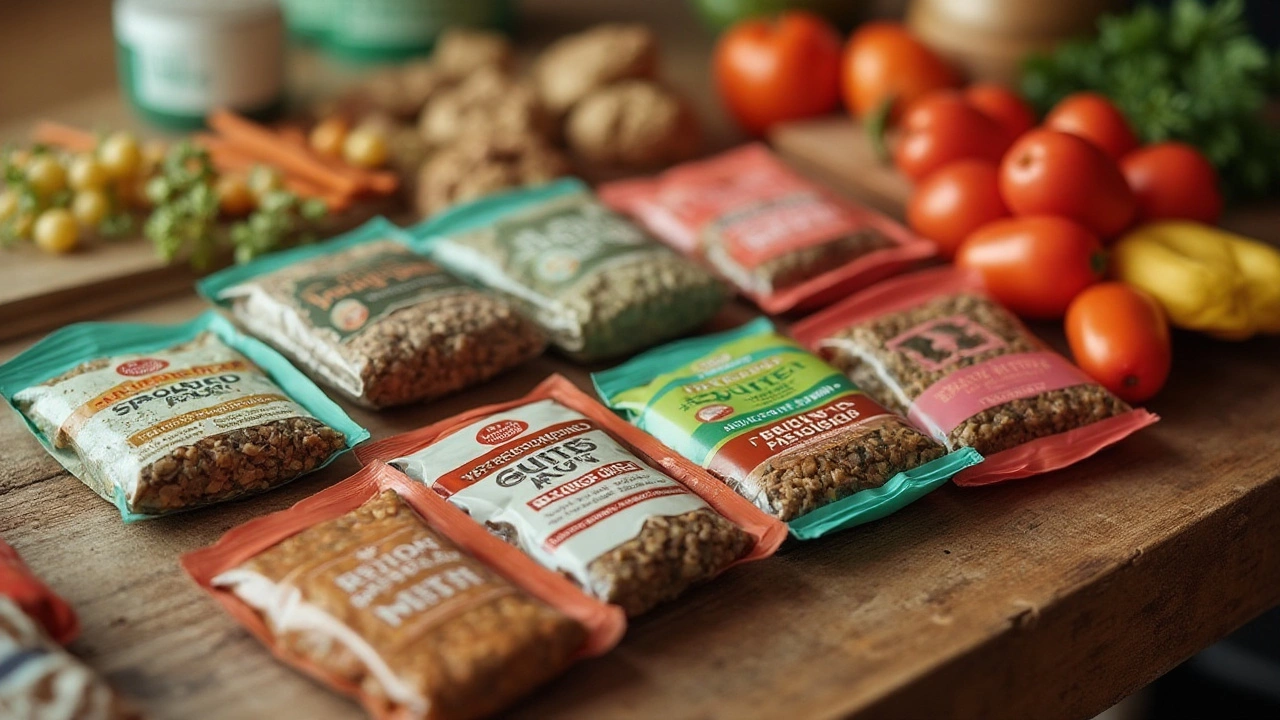When it comes to selecting the right food for our canine companions, following the advice of those who know best—veterinarians—can make all the difference. It's not just about filling a bowl with kibble; it's about nourishing our furry friends with quality ingredients that promote health and longevity.
Veterinary professionals often emphasize the importance of quality proteins, essential nutrients, and balanced formulas in dog food. With numerous brands available on the market, some consistently stand out for their dedication to health-focused recipes that support various life stages and medical needs of dogs.
Let's explore the top vet-recommended brands and understand what makes these selections beneficial for your pet. Plus, we'll equip you with practical tips for choosing the best options tailored to your dog's unique nutritional requirements.
- Importance of Nutrition
- Top Brands Recommended by Vets
- Ingredients to Look For
- Tips for Choosing Dog Food
Importance of Nutrition
Feeding your dog is more than just a daily chore; it is a fundamental aspect of ensuring their well-being. Nutrition forms the foundation for several key aspects of a dog's life, from growth and development to fighting off diseases. Veterinarians consistently stress the value of high-quality dog food in maintaining a healthy balance of nutrients, which is crucial for energy, tissue repair, and sustaining essential bodily functions. Like humans, dogs require a blend of proteins, carbohydrates, fats, vitamins, and minerals to thrive. The incorrect balance of these elements can lead to deficiencies or excesses, sometimes causing severe health issues.
The rise in obesity rates among pets underscores the importance of selecting the right type of food. Studies show that nearly 59% of dogs in the United States are overweight, which often leads to complications like diabetes, arthritis, and reduced lifespan. Ensuring your dog's diet encompasses the necessary nutrients without excess calories plays a pivotal role in maintaining an ideal weight and supporting organs like the heart and liver. Each dog's health is unique, warranting a diet that reflects their specific medical needs, age, and activity levels. For instance, puppies have different dietary requirements compared to senior dogs, necessitating adjustments in their nutrition as they age.
Understanding ingredient labels is crucial for pet owners who want to ensure that every bite counts. Be vigilant in looking for high-quality protein sources as the primary ingredient, as dogs need more protein than carbohydrates for energy. Essential fatty acids are another important component that supports brain function and keeps a dog's coat shiny and healthy. In an age where transparency is becoming more standard, some brands offer detailed information about sourcing and production methods, greatly aiding pet parents in making informed choices.
"The truth is, what you feed your dog is a critical component of their lifestyle and well-being," says Dr. Kathy Michel, a renowned veterinary nutritionist. "Investing in proper nutrition is investing in your pet's future health."
Moreover, the production processes and reputation of food brands play a significant role. High-quality vet recommended brands have rigorous testing and quality control measures to ensure both safety and nutritional value. Many of these brands work with veterinary professionals to develop formulas that support specific dietary needs, whether dealing with allergens or providing a specific blend for active dogs. As you navigate the pet food aisle, understanding the nutritional value and sourcing practices empowers you to make the best decision for your pet's nourishment.

Top Brands Recommended by Vets
When it comes to nourishing our beloved dogs, veterinarians often have the inside scoop on the best food brands. They've done their homework and seen firsthand how nutrition impacts the health of our furry friends. Many top brands have spent years researching and refining their recipes in collaboration with pet nutritionists, ensuring that their products support all aspects of a dog’s health. Brands like Hill's Science Diet and Royal Canin are often lauded by veterinarians, not just because of their comprehensive range of options, but due to their commitment to science-backed formulas. Hill’s, for example, partners with more than 220 veterinarians, food scientists and pet nutritionists to develop their range, providing tailored nutrition for every stage of a dog's life. This collaborative approach ensures their dog food adapts to the various growth, lifestyle and breed-specific needs that our precious dogs face.
Another standout is Purina Pro Plan, which frequently garners praise for its vast selection catering to different dietary requirements, including sensitive stomachs and weight management. Their formulas are enhanced by real meat as the primary ingredient and are fortified with added vitamins and minerals, reflecting their dedication to optimal canine health. Purina has invested extensively in research, even establishing the Purina Institute to advance pet nutrition and uncover solutions to pet health challenges. In a recent study, dogs that were fed a diet high in meat, vegetables, grains, and fish oil experienced improved cognitive function into old age, highlighting the nutritional benefits Purina Pro Plan aims to deliver.
To give you a better perspective on dog nutrition, Royal Canin is another brand that stands out, renowned for its breed-specific and condition-specific formulas. With its roots in vet-founded solutions from the 1960s, Royal Canin has a legacy of adapting to the unique health needs and preferences of different dog breeds. Their Yorkshire Terrier Puppy food, for instance, is meticulously designed to support the coat health and evolving needs of the breed. By focusing on the personalized needs of dogs with varied lifestyles, Royal Canin continues to earn its spot among brands respected by veterinarians.
In the words of Dr. Susan Johnson, a noted veterinarian, "The best dog foods are not only scientifically sound but also customized for our pets’ evolving lifestyles, and brands like Hill's and Royal Canin have shown consistent commitment to this ideal."
Finally, let's not forget about the importance of nutrition in maintaining health. The importance of ingredients like omega-3 fatty acids for brain health, and antioxidants for immune system support, can't be understated. There are tables across research studies that reflect on the weight of balanced nutrient compositions, showing stats like omega fatty acid content resulting in a visible improvement in dogs' coat sheen and vitality in a span of just six weeks. These nutritional adjustments, thanks to vet-endorsed brands, can truly make a life-altering impact on your pet's quality of life.

Ingredients to Look For
Selecting the right dog food can feel overwhelming, especially with so many options claiming to be the best. But when you strip it down to the essentials, some core ingredients are pivotal for a dog’s health and vitality. Protein is an absolute must, forming the foundation of any good dog food. This vital nutrient supports muscle development and keeps their body in peak condition. Look for high-quality protein sources like chicken, beef, or salmon listed as the first ingredient because it indicates that protein is the main component of that food. Proteins from real meat sources help maintain muscle mass, which is especially crucial for active or older dogs who may be losing muscle tone.
An essential aspect of a healthy diet is incorporating the right fats, again typically from named animal sources. Fats are often misunderstood but they’re crucial for providing the energy dogs need to run, play, and wag their tails. Omega-3 and Omega-6 fatty acids, such as those found in fish oil or flaxseed, promote a glossy coat and reduces inflammation. Another key ingredient is carbohydrates, which should come in the form of whole grains like brown rice or oats rather than fillers like corn and soy. These healthier options ensure a balanced energy release throughout your dog’s day.
Fiber is another component to be on the lookout for. It aids in digestion and keeps things moving smoothly, encouraging regular bowel movements. Ingredients like beets or chicory root can provide digestible, healthful fiber while also keeping bad bacteria at bay in the gut. Make sure the food you choose includes a sensible amount of fiber to maintain digestive health without overdoing it.
"Understanding the role of each ingredient can not only guide healthier choices but also aid in identifying potential allergies or intolerances. Taking a closer look at the ingredient list helps discern high-quality options," recommends Dr. Michelle Salas, a noted animal nutritionist.
Vitamins and minerals are the underappreciated backbones of your dog's nutrition. Calcium and phosphorus, essential for bones and teeth, should be balanced in proper ratios; vitamin A supports healthy vision, while zinc and selenium are critical for immune function. Natural sources of these nutrients, like fruits and vegetables, are preferable—think carrots, sweet potatoes, and leafy greens. This approach is akin to how we incorporate nutrients into our own diets.
Below is an example of common beneficial ingredients to search for in your dog food:
- High-quality protein (e.g., chicken, beef, salmon)
- Healthy fats (e.g., fish oil, flaxseed)
- Whole grains (e.g., brown rice, oats)
- Digestible fiber (e.g., beets, chicory root)
- Essential vitamins and minerals (e.g., calcium, vitamin A)
Choosing dog food isn’t just about satisfying hunger; it’s about cherishing and prolonging our cherished friends' lives. Paying attention to these key ingredients will pave the way for better health outcomes and more joyful moments with your precious pup.

Tips for Choosing Dog Food
Choosing the right dog food can feel overwhelming, but getting it right is crucial for your pet's health. Fortunately, there are a few guiding principles that can make the decision more straightforward. First, observe your dog's unique needs. Is your furry friend young and full of energy, or are they entering their senior years with different nutritional requirements? Puppies generally need more calories and specific nutrients for growth, while older dogs might benefit from a diet rich in fiber and joint-supporting ingredients. Pay close attention to any dietary restrictions or allergies your dog might have, as these will influence the type of dog food that is suitable.
Check the ingredient list on the packaging, which is a helpful tool in choosing quality dog food. Look for foods where real meats or named meat meals are the top ingredients. Avoid those that list vague terms like 'meat by-products' as primary ingredients, which might not provide the best nutrition. Valuable carbohydrates from whole grains, vegetables, and fruits are preferred over fillers like corn and soy. Also, fats are essential for energy, but they should come from healthy sources. Omega-3 fatty acids from fish oil, for example, are excellent for a healthy coat and brain function.
It's always wise to consider the reputation of the dog food brand. Brands that invest in research, conduct feeding trials, and have veterinarians on staff often produce higher quality products. Such companies are committed to transparency about the source of their ingredients and maintain strict manufacturing standards. Dr. Jennifer Larsen, a respected veterinary nutritionist, highlights in an article, "Brands that test their diets and ensure a thorough analysis tend to offer more reliable nourishment for your pet."
In some cases, the type of dog food—dry kibbles, canned, raw, or home-cooked—might also factor into your choice. Each type has its benefits and potential drawbacks. Dry kibble is convenient and helps with dental hygiene, while wet food can be more appetizing for some dogs. Raw diets might require more preparation and careful handling, but advocates argue they are more natural. Regardless of type, ensure that the dog food you choose is AAFCO-approved, which indicates it meets the basic nutritional standards for pets.
Incorporating feedback from your dog is an essential part of this process. Notice how your pet responds to a new dog food. Is their coat shiny and soft? Are their energy levels consistent? If you see any adverse reactions like digestive issues or skin irritations, it might be necessary to transition to another option or consult your veterinarian.
| Nutritional Aspect | Young Dogs | Senior Dogs |
|---|---|---|
| Protein needs | High | Moderate |
| Calorie intake | High | Lower |
| Fiber content | Low | High |
When selecting the best food for your dog, patience, observation, and informed decision-making play crucial roles. With your careful attention and love, paired with veterinary insights, you'll ensure your dog thrives on the vet recommended diet you've chosen.









